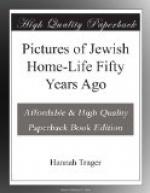“By the Chevra Kadisha beggars and tramps are thus washed and buried when dead, free of expense, by these good, self-sacrificing people, at all times and in all weathers, as a sign that in death all are equal. The people who can afford it leave enough money to pay all their own burial expenses or these are paid for by their relatives.
“Acts of charity towards very poor girls who have no dowry or suitable wedding-clothes are very touching and generous. It is considered a disgrace to the community if a poor girl is not given the opportunity to marry, and a community not only provides a dower, but also seeks for a bridegroom for her. The housewives willingly and generously prepare the wedding-feast, for everyone is willing to give something from their store-room. No shame is attached to poor girls accepting such help; for it is considered a duty by all our brethren to provide what is necessary for a bride who has not the means to get things for herself.
“I am sorry that I cannot write more by this mail.”
One listener interrupted, saying: “Most of what you have read Mr Jacob happens in Russia and in other parts of the world where Jews live in ghettos.”
“Quite true,” said Mr Jacob, “for wherever Jews live together they keep up old customs, and all old customs are more or less alike in all ghettos. It is only when we Jews live outside the ghettos, under different surroundings, that we are tempted to throw over many religious customs. The unfortunate thing is, that we are too often inclined to throw off the really good customs rather than the useless ones, and more inclined to adopt the bad traits and customs of our neighbours rather than the good ones amongst whom we live, be it in England, France, Germany, India, or elsewhere. This is a bad habit, and we must do our utmost in the future to guard against it; for, if we all made an effort to retain our own ancient customs that are really good and beneficial to ourselves and others and adopt only the good and healthy customs of our neighbours, then, indeed, we might feel we had a right to call ourselves and be recognized by those we live amongst as ‘God’s Chosen People.’”
FATHER FROST IN JERUSALEM
The next Friday evening Mr Jacob read the following letter.
“My Dear Cousin Mill,—I have not yet written to tell you how we manage during cold weather. Before we arrived, we were under the impression that it was always warm in Palestine. Certainly the sun does shine more in winter here than in England, and while it shines the weather is very pleasant; but we get very cold weather, too, especially in Jerusalem. We get very little snow, but a good deal of frost, which no one enjoys. No doubt you wonder why, because we all enjoyed the cold and frost in England, and loved the skating and the snowballing.




